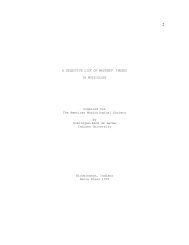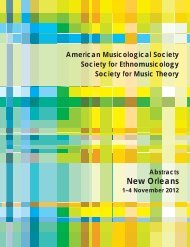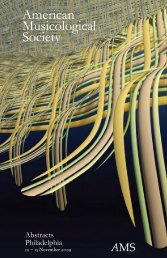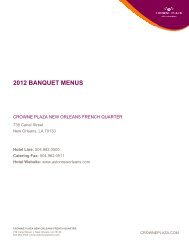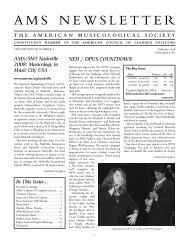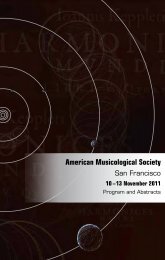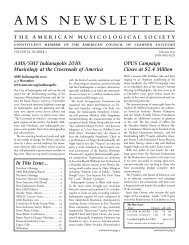Abstracts - American Musicological Society
Abstracts - American Musicological Society
Abstracts - American Musicological Society
Create successful ePaper yourself
Turn your PDF publications into a flip-book with our unique Google optimized e-Paper software.
28<br />
FridaY morning<br />
the music on purely nuslcal, analytical grounds-' wi.th<br />
examples fron Mahler's syurphonies (especially the<br />
Ninth), I examine the conventionally acquired semantic<br />
and syntactic meanings carried by the heterogeneous<br />
"typ." of materials" incorporated into the nusic' Th'<br />
significative network generated hereby interacts with<br />
the new, non-conventional context in which it appears'<br />
Fron this dialectic results that story- like quality<br />
rrhich gives the expressiveness of Mahler' s music a<br />
universality not allowed by the concreteness of the<br />
autobiographical thesis .<br />
CRITICAL VOCABULARIES<br />
Piero Weiss, Peabody Conservatory of Music Chair<br />
'ELEGANCE' AS A BASIC CRITERION IN MUSIC CRITICISM<br />
Don Harr6n, Hebrew University, Jerusalem<br />
The term elegance is one of a number of terms<br />
borrowed from rhetoric and applied to music, in<br />
theoretical Lrritings, from ancient tirnes on. It is<br />
considered here for its impact on music criticisn, with<br />
special enphasis on the earlier period (until the<br />
seventeenth century) .<br />
1. Elegance as defined by the literary critics,<br />
among them Horace and Bernbo. Beyond the various<br />
meanings they assigned to elegance, three points are<br />
examined: the relevance of Iiterary doctrine to music<br />
as gag and scientia; the difference between elegance<br />
and eloquence; the relation of elegance to model<br />
theory, linking improvements in the practice of speech<br />
to the initation of worthy examples.<br />
2. Barbarism, the contrary of elegance. The<br />
notion wil be traced as a constant in early grammatical<br />
and music theory (the critics asked to rid language of<br />
its corruptions, i.e., its vitia and barbarisni).<br />
3. To be distinguished frorn elegance is the term<br />
propriety, likewise fundamental to licerary criticism,<br />
It wiIl be explained by reference to what the music<br />
theorists described as "proprieties" of composition, of<br />
text placement, of singing.<br />
4. The notion of elegance as an aesthetic<br />
desideraturn implies a novel view of the musican as<br />
orator, as poet. Renaissance ttreorists will be<br />
considered for their observations on the particular<br />
kind of musician who responds to the urge for elegance.<br />
Clearly, the term elegance is so broad as to be<br />
useful, beyond the temporal confines of the pru"".ra<br />
report , for nusic criticisn at 1arge. It o,l r, .<br />
discussed, tn conclusion, for irs<br />
t:<br />
"plfi""li1r;;':"



